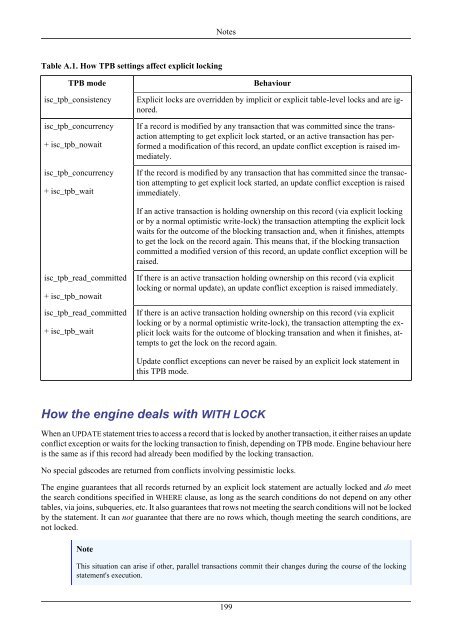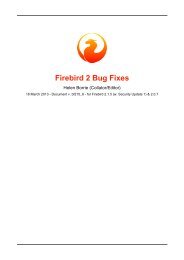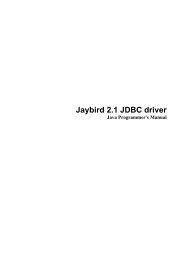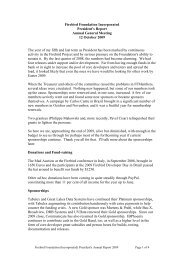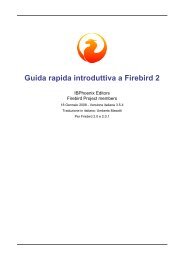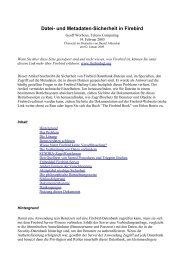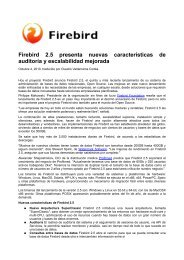Firebird 2.1 Language Reference Update
Firebird 2.1 Language Reference Update
Firebird 2.1 Language Reference Update
Create successful ePaper yourself
Turn your PDF publications into a flip-book with our unique Google optimized e-Paper software.
Table A.1. How TPB settings affect explicit locking<br />
Notes<br />
TPB mode Behaviour<br />
isc_tpb_consistency Explicit locks are overridden by implicit or explicit table-level locks and are ignored.<br />
isc_tpb_concurrency<br />
+ isc_tpb_nowait<br />
isc_tpb_concurrency<br />
+ isc_tpb_wait<br />
isc_tpb_read_committed<br />
+ isc_tpb_nowait<br />
isc_tpb_read_committed<br />
+ isc_tpb_wait<br />
If a record is modified by any transaction that was committed since the transaction<br />
attempting to get explicit lock started, or an active transaction has performed<br />
a modification of this record, an update conflict exception is raised immediately.<br />
If the record is modified by any transaction that has committed since the transaction<br />
attempting to get explicit lock started, an update conflict exception is raised<br />
immediately.<br />
If an active transaction is holding ownership on this record (via explicit locking<br />
or by a normal optimistic write-lock) the transaction attempting the explicit lock<br />
waits for the outcome of the blocking transaction and, when it finishes, attempts<br />
to get the lock on the record again. This means that, if the blocking transaction<br />
committed a modified version of this record, an update conflict exception will be<br />
raised.<br />
If there is an active transaction holding ownership on this record (via explicit<br />
locking or normal update), an update conflict exception is raised immediately.<br />
If there is an active transaction holding ownership on this record (via explicit<br />
locking or by a normal optimistic write-lock), the transaction attempting the explicit<br />
lock waits for the outcome of blocking transation and when it finishes, attempts<br />
to get the lock on the record again.<br />
<strong>Update</strong> conflict exceptions can never be raised by an explicit lock statement in<br />
this TPB mode.<br />
How the engine deals with WITH LOCK<br />
When an UPDATE statement tries to access a record that is locked by another transaction, it either raises an update<br />
conflict exception or waits for the locking transaction to finish, depending on TPB mode. Engine behaviour here<br />
is the same as if this record had already been modified by the locking transaction.<br />
No special gdscodes are returned from conflicts involving pessimistic locks.<br />
The engine guarantees that all records returned by an explicit lock statement are actually locked and do meet<br />
the search conditions specified in WHERE clause, as long as the search conditions do not depend on any other<br />
tables, via joins, subqueries, etc. It also guarantees that rows not meeting the search conditions will not be locked<br />
by the statement. It can not guarantee that there are no rows which, though meeting the search conditions, are<br />
not locked.<br />
Note<br />
This situation can arise if other, parallel transactions commit their changes during the course of the locking<br />
statement's execution.<br />
199


